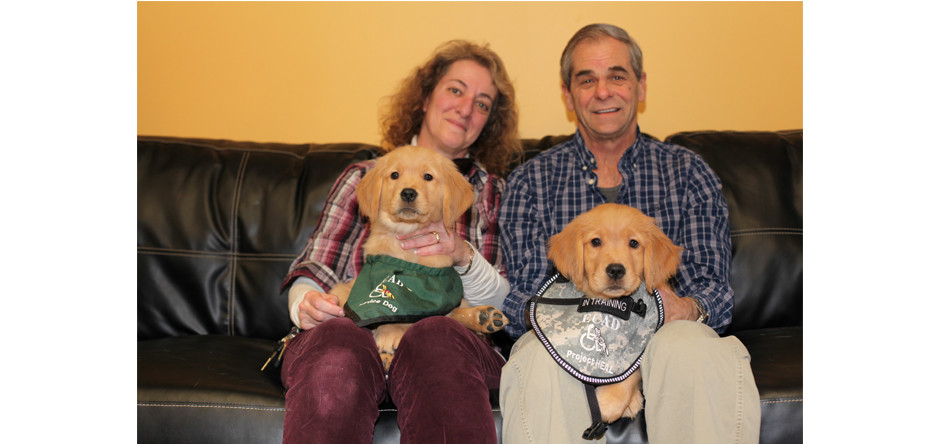Story and photographs by Mary Sue Iarocci
For disabled veteran Nicholas Montijil, going out in public used to be a nightmare.
It was hard for the 26-year-old Marine Corps veteran from Milwaukee, whose military service included a combat tour in Afghanistan, to predict what would trigger symptoms of Post Traumatic Stress Disorder (PTSD).
Even hearing a common sound like a high-pitched laugh during a trip to the mall could cause him to panic and shut down, and it got to the point where he wasn’t able to navigate the outside world alone.
So Montijil stayed home — a lot. It was as if his life was on hold until hope came in the form of a 2-year-old black Golden/Labrador Retriever mix named Tabor.
“The day I got the phone call that I was getting a service dog was one of the greatest days of my life,” says Montijil, who applied for his service dog through Dobbs Ferry-based nonprofit Educated Canines Assisting with Disabilities (ECAD) on the recommendation of his doctor. “I was in a really dark place just dealing with the world and having the hope that this dog would come around eventually and be there to help me live my life pushed me to get through that period.”
Now celebrating its 20th anniversary, ECAD trains service dogs to help people with more than 60 disabilities achieve greater independence and mobility while also placing facility dogs in hospitals, nursing homes and courtrooms.
Service dogs have highly specialized skills and can perform a wide variety of tasks including everything from opening doors to activating light switches and pulling wheelchairs to clearing the dinner table and helping load the dishwasher.
“She gets my mail, carries my drinks and can even do the laundry,” 30-year-old Jeremy Cote of Goshen, Mass., whose balance issues require him to use a wheelchair, says of his ECAD service dog, Brie. “When we go to a restaurant she carries the doggy bag out and that always gets a lot of attention, a dog carrying a doggy bag.”
To date, ECAD has placed 275 service dogs in 20 states and has grown to include 15 employees and 100 volunteers on two campuses, including its main office and Canine Education Center at The Children’s Village in Dobbs Ferry and another training facility in Torrington, Conn.
Dale Picard, who founded ECAD with his wife, Lu, in 1995, says the idea for the organization was formed after his father-in-law had a stroke.
“He went into the hospital and came out half the man that he was before he went in,” he says. “He couldn’t take care of himself or even get himself up off the couch to go to the bathroom. But he didn’t want to go into a rehab facility and wound up coming back to our house.”
One day Lu Picard had an idea: What if she could train her pets to help her father with simple tasks that he was unable to perform himself?
“I started to teach our dogs little things like to retrieve the remote control or to help him get up off the couch, and it worked so well that I decided I wanted to perfect my craft and do this for other disabled people,” she says. “I didn’t realize what I was getting into when I started. I thought this would be all about the dogs, but it is very much people-based. For someone who is disabled, a service dog can change their life.”
Dale Picard says ECAD service dogs, all Golden Retrievers and Labrador Retrievers bred at its Torrington campus, know about 90 words or commands and are all trained by at-risk youth at residential treatment facilities, including The Children’s Village and Graham Windham in Hastings-on-Hudson.
A service dog is ready for placement at 18 months to 2 years of age and after having at least 1,400 hours of hands-on positive reinforcement training. It costs about $30,000 to raise and educate a service dog and although ECAD does not charge for one, a client is expected to pay $8,500 for a two-week intensive training workshop before he is placed with a service dog.
Although ECAD is actively accepting applications and interviewing candidates, there is a two-year waiting list for a service dog — something the organization hopes to change by expanding.
“We’re looking to grow,” says David Post, ECAD’s management consultant. “Right now, we are going into a $5 million capital campaign where we hope to find a much larger facility that will allow us to double or even triple our placement rate and to offer broader kinds of services to help more people.”
“Denim Heels Boots Tails,” ECAD’s annual fundraising event, will take place at 6:30 p.m. May 7 at the Brynwood Golf and Country Club in Armonk. The evening will include dinner, dancing, a live auction and a program with ECAD clients and their service dogs in attendance. Tickets are $200 per person. For information on sponsorship opportunities, including the purchase of a table, call 914-693-0600, ext. 1950. For further information, visit ecad1.org/dhbt. And for more general information, visit ecad1.org.




